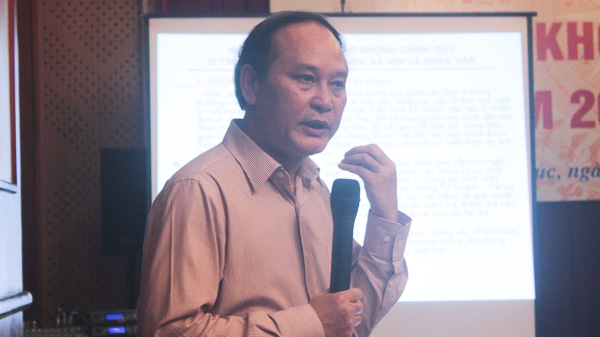On April 7, 2013, the University of Social Sciences and Humanities held a conference to summarize non-formal training activities in 2011-2012 in Vinh Phuc.Attending the conference were Associate Professor Dr. Nguyen Van Kim - Vice Principal of the University, leaders of Faculties/Departments, functional departments, training assistants of Faculties. The conference aimed to evaluate and summarize the non-formal training work in 2011 - 2012 and discuss the draft guidelines for organizing non-formal training in the coming time. The opinions presented at the conference especially emphasized the important role of non-formal training in a number of fields to meet the social needs of social science and humanities resources. The training cooperation with partners in many provinces and cities across the country has contributed to promoting the image of the University and contributing to training human resources to serve the cause of socio-economic development of the country in localities.

Next, opinions focused on discussing and giving comments on the following contents: the issue of organizing general subjects, Foreign Languages, Information Technology and National Defense and Security Education; the issue of applying positive factors of credit training in part-time training, how to organize and implement part-time training according to the credit training program framework; the issue of collecting tuition fees, implementing short-term training to grant certificates... Some other opinions shared experiences in organizing and managing part-time training in localities and at the same time proposed recommendations to improve the quality and effectiveness of non-formal training. Summary of non-formal training in 2011 - 2012, the School has achieved outstanding results: in coordination with units inside and outside the School, the school has organized the enrollment of over 1,500 students in the work-study programs, college-to-university transfer programs, work-study diploma programs, short-term training programs with certificates, and supplementary university knowledge for graduate exams. Especially on the basis of formal training programs, units have applied positive factors in organizing the teaching of the work-study program such as: applying the credit-based training program framework, increasing the time for self-study, guided practical practice, flexible mechanisms in accumulating subjects in different classes... Along with that, training processes such as: teaching plans for each semester, organizing tests, and final exams are carried out in accordance with regulations; closely coordinating with partners in managing and organizing classes. However, non-formal training in recent times still has some shortcomings in the organization and training process: the quota is decreasing, the training management software has not been deployed, the inspection and examination of classes have not been carried out regularly, and the collection of tuition fees still has many problems. Concluding the conference, Associate Professor, Dr. Nguyen Van Kim - Vice Principal of the School highly appreciated the role and results of non-formal training that have been achieved. At the same time, he affirmed that many non-formal training programs of the School have been organized in provinces and cities across the country from Ha Giang to Ca Mau. The demand of society for human resources in social sciences and humanities is very large, many partners have expressed their desire to cooperate in training with the School. The Vice President emphasized that in the coming time, non-formal training needs to focus mainly on key goals: constantly improving training quality, closely combining research and training, designing training programs to meet the needs of society, opening new majors and majors. In particular, non-formal training must integrate with formal training, meeting the standards of formal training.

